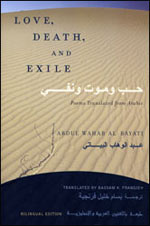 Called "a major innovator in his art form" by THE NEW YORK TIMES, Baghdad-born poet Abdul Wahab Al-Bayati broke with over fifteen centuries of Arabic poetic tradition to write in free verse and became world famous in the process. LOVE, DEATH, AND EXILE: POEMS TRANSLATED FROM THE ARABIC is a rare, bilingual facing-page edition in both the original Arabic text and a highly praised English translation by Bassam K. Frangieh, containing selections from eight of Al-Bayati's books of poetry.
Called "a major innovator in his art form" by THE NEW YORK TIMES, Baghdad-born poet Abdul Wahab Al-Bayati broke with over fifteen centuries of Arabic poetic tradition to write in free verse and became world famous in the process. LOVE, DEATH, AND EXILE: POEMS TRANSLATED FROM THE ARABIC is a rare, bilingual facing-page edition in both the original Arabic text and a highly praised English translation by Bassam K. Frangieh, containing selections from eight of Al-Bayati's books of poetry.
Forced to spend much of his life in exile from his native Iraq, Al-Bayati created poetry that is not only revolutionary and political, but also steeped in mysticism and allusion, moving and full of longing. This collection is a superb introduction to Al-Bayati, Arabic language, and Arabic literature and culture as well.
On Al-Bayati's death in 1999, THE NEW YORK TIMES obituary quoted him as saying once that his many years of absence from his homeland had been a "tormenting experience" that had great impact on his poetry. "I always dream at night that I am in Iraq and hear its heart beating and smell its fragrance carried by the wind, especially after midnight when it's quiet."
From the Publisher
"In these elegant, passionate, and metaphorically inventive poems history intersects with contemporary life in ways that will surprise anyone interested in either literature or the Middle East. At turns haunting and inspiring, they give us a deeper present and a more informed future than we had before." --Cary Nelson, author of REVOLUTIONARY MEMORY: RECOVERING THE POETRY OF THE AMERICAN LEFT and editor of the ANTHOLOGY OF MODERN AMERICAN POETRY
"Brilliant . . . . This translation of such difficult, multimasked poetry is a real gem." --Sonallah Ibrahim, Egyptian novelist and essayist with photographer Jean-Pierre Ribiere, of CAIRO FROM EDGE TO EDGE
"'The night overtook the day,' and Abdul Wahab Al-Bayati overtakes the reader with his deeply somber and vivid poems that never cease to ask: 'why did the nightingale of love fly away. . . why do we cry. . . what did the song say?' The work in this collection is carved with light and darkness, taking us to the cracks of a nation, where 'in the coffeehouse of the East [they] were defeated by the war of words' to the pulse of exile, where 'no one knows another,' were killed 'before [they] loved each other.' Bayati tells us that in exile we encounter death, in this death we find life, and love carries us through it all. For the poet, exile like love and death is a prison and an infinity. Bassam K. Frangieh's translation renders the passion of these poems beautifully, and we know now, when 'the poet departed… his footsteps drew the map of things,' and we are forever led 'blind into exile: eye of the sun.'" --Nathalie Handal, author of THE NEVER FIELD and editor of THE POETRY OF ARAB WOMEN: A CONTEMPORARY ANTHOLOGY
"[Frangieh] has constructed a beautiful and worthy portal for his powerful and accurate portrayal of Al-Bayati the poet through his own words. Al-Bayati's importance as a poet and a voice of modern Arab intellectual culture is successfully transmitted through the selection and translation. We observe his development as a poet, enjoying the development of particular messages, and his play with poetic form. . . . Al-Bayati and Frangieh have given us a most satisfactory read!" --Middle East Studies Association Bulletin
"Faithful and sensitive. An added attraction to this excellent performance is the printing of the Arabic text facing the English translation." --Irfan Shahid, Sultanate of Oman Professor of Arabic Language and Literature, Georgetown University, and author of BYZANTIUM AND THE ARABS IN THE SIXTH CENTURY
"This fine publication will be welcome to specialists in the field and should be a revelation to a wider circle of poetry lovers." --Middle East Journal